"It is all a matter of time scale. An event that would be unthinkable in a hundred years may be inevitable in a hundred million." -Carl Sagan
There's some speculation that NASA, later this week, might announce evidence for life on Saturn's moon Titan.
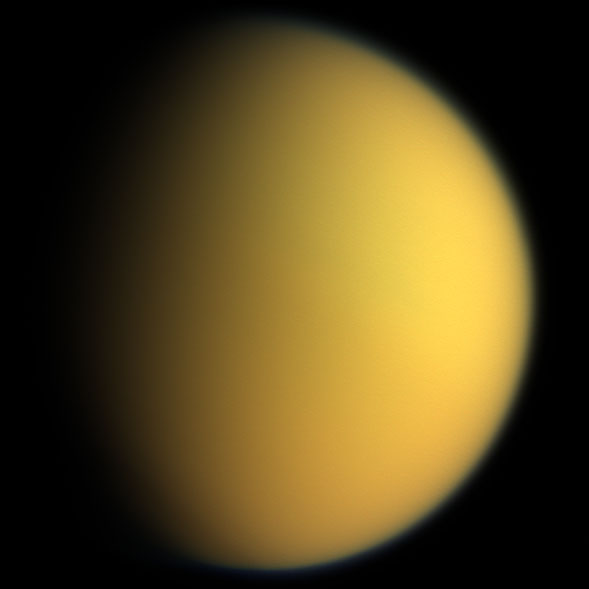
I'm not going to comment on the speculation, but it's worth asking the question, scientifically, "How would the Universe make life, from scratch?"
Let's start by telling you what "scratch" means. If you're familiar with the story of the Universe, one of the things you know is that things were very hot and dense in the past. So hot that you couldn't have neutral atoms, or even protons and neutrons bound to one another.

But the Universe cooled quickly, and by time it was a mere 4 minutes old, it's too cool to keep fusing elements together; all you've got at this point is a Universe that's (by number) 92% Hydrogen, 8% Helium, and less than 0.0000001% anything else. Sure, your Universe will expand and cool, but it isn't for millions of years (and more likely, tens of millions of years) that you start to change what the Universe is made out of.
Because it takes that long for gravity to pull this primitive gas into a dense enough region that we can -- for the first time in the Universe -- form stars!
And these stars, like all bright stars, get their energy by fusing these light elements into heavier ones. If we could look inside the most massive of these stars, know what we would find?

That a great deal of this hydrogen and helium has fused into heavier elements, including Carbon, Nitrogen, Oxygen, Phosphorous, Silicon, Sulfur, and Iron: many of the building blocks of life!
But these stars don't live forever. If the star is up to about four times as massive as our star, when it runs out of fuel, it blows off the majority of its outer layers in a spectacular display, producing a planetary nebula, like the Helix Nebula (below).
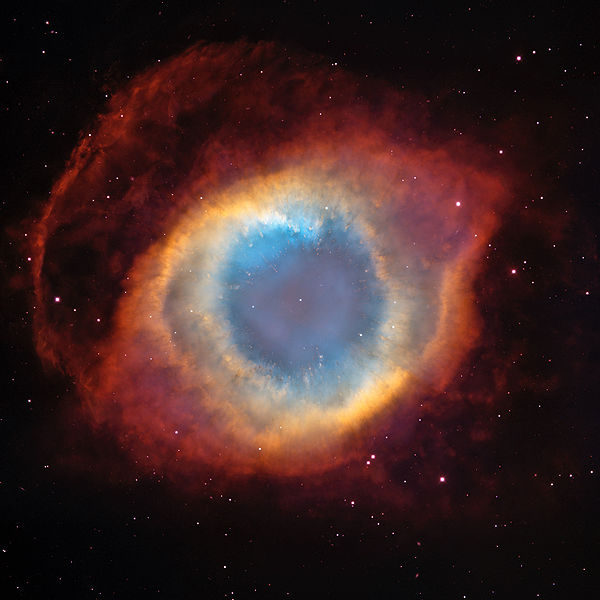
But if your star is more massive than that -- and some of them are hundreds of times as massive as our Sun -- you get an explosion that rips the star apart in seconds (instead of thousands of years), known as a supernova!

And the 13.7 billion years our Universe has been around is more than enough for this to have happened multiple times. And about 4.6 billion years ago, a highly enriched cloud of gas and dust -- mostly hydrogen but with plenty of other elements -- collapsed to form our Solar System.
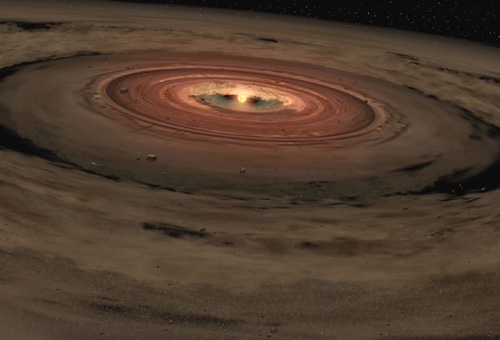
But when you get a whole bunch of elements together, spinning around, they don't simply collapse to form moons, planets and stars, although they do form those things, like Titan, shown below.
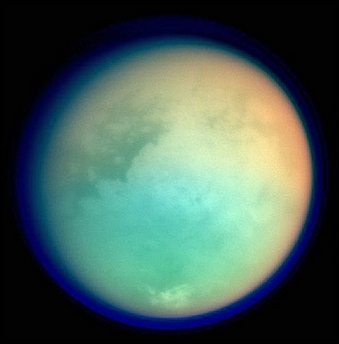
You also create the largest chemistry sets in the Universe. With carbon, nitrogen, oxygen, and hydrogen, plus a few trace amounts of other elements and some energy, you can create a brilliant laboratory setup to re-create what might have happened billions of years ago on Earth.

This setup is known as a Miller-Urey Experiment, and can, among other things, produce sugars and amino acids. In other words, organic molecules.
Variations on this experiment have gone as far as producing molecules such as adenine, one of the building blocks of DNA and RNA.
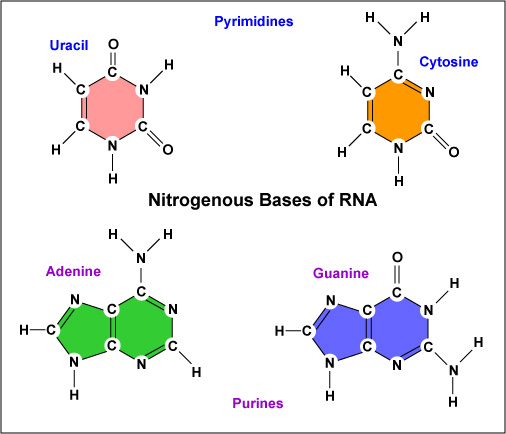
That's a pretty story, of course, and you might ask what evidence we have that the Universe -- on its own -- actually does this. It's one thing to do it in a lab, but it's quite another to leap to the conclusion that the Universe does this on its own.
I mean, it's not like the evidence just falls out of the sky, right? Right?
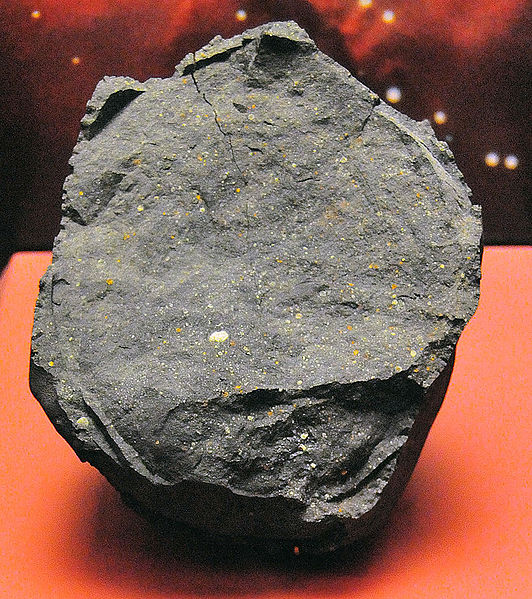
Take a look at a fragment of the Murchison Meteorite, a meteorite totaling over 100 kilograms that fell in Australia in 1969. Over 14,000 organic molecules were identified in this meteorite, including over 70 amino acids not found on Earth.
In other words, just the presence of these atoms in space, in a typical star system, will give you the building blocks of life! The Universe, through simple chemistry of the elements made in the nuclear furnaces of stars, gives you all the ingredients for life.

Which brings us back to Titan. With liquid ocean and towering cryovolcanoes, could Titan be harboring life? We may only need to look beneath its atmosphere to find out.

Right now, there's no direct evidence, and I seriously doubt that's going to change on Thursday, when NASA makes their announcement. But the building blocks of life are everywhere, and I'd be shocked if we didn't discover life itself elsewhere in our galaxy in the near future. After all, the building blocks are everywhere...

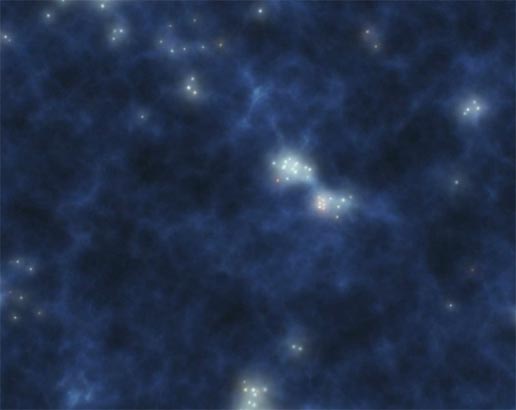

While the building blocks might be there, the temperature on the surface is somewhere at -100 C. What means that the random event speed is orders of magnitude slower than on earth, so the likelihood of that lucky first self replicating molecule starting life is much more reduced. Of course, deep under the surface might be the same type of hydrothermal vents we have in the deep ocean, and the temperatures might be just right for rapid formation of organic molecules.
Sadly, after a decade of pointless wars, we no longer have the national will or the budget to launch an exploratory mission. It may fall to India or China to use this as an opportunity to further establish themselves as premiere technological and economic powers.
Your post seems to be missing supernova nucleosynthesis. Although you mentioned supernova as a scattering the elements created during the stars life you forgot to mention that during the supernova itself all the elements heavier than iron are created. At least to me it wasn't clear.
"The Universe, through simple chemistry of the elements made in the nuclear furnaces of stars, gives you all the ingredients for life."
Yup, you get all of the ingredients except a soul and only God can make a tree.
Was wating for a comment like the one from Bob Mrotek.
(You want to give us the atomic structure of the soul Bob?)
Dont bother Bob (and anyone else) this is a science site.
Apologetics, canards obfuscation and straight out lies are all you people have.
If for ONCE any of you came up with some credible evidence we might listen. Until then....
Sorry, Bob Mrotek, but there is no soul. Also trees are made by other trees, by the billions, no fake father figure needed.
Oh dear Bob. If we have all the ingredients, why do we require an imaginary sky man to make the tree? Curiously, your post seems to imply that trees have souls.
Of course trees have souls! And trees go to tree heaven after they die, a special place free of wood-boring beetles.
It is unclear where pious wood-boring beetles go.
@Bob
Understanding the concept of a soul and god wouldn't have been a bad idea before you commented something like that here.
ah damn, those quizative earthlings finally figured it out...
beneath the cold frozen erupting exterior of Titan lies a luscious layer of tropical paradise with scantily clad natives,five star hotels, complete with tiny umbrellas and plenty of ice for those ever so soothing tropical drinks.
Titan will never be the same.(now that everyone knows)
You've been trolled by Bob I think. He was being ironic.
"It is unclear where pious wood-boring beetles go." They go to tree hell, it saves on metaphysical real estate.
Of course turning organics chemicals into a bacteria is still not understood in the final detail. What is? As well, the idea of what constitutes a life form is shifting.
"Bacteriophages are the most abundant life form on our planet". "Bacteriophages, i.e. bacteria viruses, are biological entities".
But whether "life form" or "biological entity" is a definitional distinction. As Clinton said, "It depends on what the meaning of the word 'is' is."
Is "god" an impersonal god, one of multiple gods and goddeses, the entire living universe. I have known theist of each persuasion.
Aah, you want to use your definition of "god". Very well, we shall add your common usage definition to the unabridged online dictionary.
But a science definition must describe a potentially observable phenomenon. Science definitions are different in the detail from common usage definitions.
To me, religion is either about politics and power or poetry and philosophy.
Power and politics folk nail every Galileo or Christ to a cross; poetry and philosophy folk laugh at the incomprehensible mystery of being in this world.
Whatever your religious orientation, science increase either the nailing or the laughing.
Well, at least we don't have to ask if life is possible or what the materials consist of, we just need to figure out how to get the stuff started in the first place. Look to the Chinese and Russians to figure this out, they have the best experience in reverse engineering things. Just take it back a few billion years and there ya go.
Never knew the 70 amino acids not formed on earth fact, interesting!
I await NASA's astrobiological announcement.
#14, great summary
Bob, you do religion a disservice with your remarks. If we accept (some don't, some do, but that's personal choice) the hypothesis that not only God exists but he also created the universe then I think there is a necessary conclusion. And that conclusion is that the entire panoply of the laws of science are the tools that God used to create the universe and all that it contains. In that case all observable phenomena will be ultimately explainable in scientific terms (it may take us many thousands of years to get there). After all, why should God abrogate his own laws? So finding scientific explanations for phenomena like life does not disprove the God hypothesis. By this definition there is no such thing as the supernatural since it would seem reasonable to believe that he would always act through the agency of the laws of science that he created.
The more interesting question is the one of how did the laws of science originate? Did they really come into existence at the moment of the Big Bang? If so, what are the laws that describe how that could happen? But now we have meta laws and where did they come from?
I should add that I am well aware that there are two broad schools of thought about the nature of the laws of science. One is the view that the laws are merely our way of modelling how the world behaves. The other is that the laws represent an underlying reality that governs how the world behaves.
The 'laws as model' approach makes questions about the origin of the laws of science unnecessary. But 'governing laws' raises some deep questions. And the way we conduct science contains an implicit belief in 'governing laws'.
Great post! Please keep it up. It's increasingly a rare experience to visit Science Blogs and be able to read a blog that's largely about science, as opposed to those which are largely about everything but science.
PDO Smith
The concept of "god" or "God" is not a hypothesis under consideration by physics. The scientific answer to the god belief is "no comment"; unless we enter a discussion with e.g. Oliver Sacks' on the relation of "temporal lobe epilepsy" to religious experience. But then, we consider specific findings of neurology, psychology and biology; and certainly not the god ideas of different religions.
"Nature" (this stuff of which we are a part and in which we live, experiment and observe) acts and reacts regardless of our puny understanding which we might with great hubris call a "governing law". I don't know of any "governing law" which has been tested in every appropriate situation. No! Every physics theory, model or "law" is a tentative hypothesis that is continually being tested. Look at the contradictory theories hoping for experiment time at CERN. If science is to learn something new; experiments must be done at the edge where results are in doubt.
As for your "interesting question", "how did the laws of science originate"? The historic answer is in the minds of men and women. That also is where religious ideas have originated. To go further is to go beyond the evidence to the area of working hypothesis (in science) or belief (in religion). Working hypotheses are limited to "nature"; while beliefs may go beyond the testable and include "supernature".
Person of science and religion eventually realize that no scientific or religous story is correct down to the smallest detail of "nature". Thus claims of absolute truth are viewed with suspicion by both religious and scientific communities.
you all are nerds
I am quite curious about this belief in the big bang theory. My question that has not been adequately answered is based on this assumption, you say that hydrogen and helium, and maybe other elements as well, existed and then âbangâ the universe was set into motion forever expanding. The question which naturally arises from this assumption is, what caused those elements to come into existence? Are they eternal elements with no beginning or end, or is there another answer?
We see causal relationships all around us so why would the beginning of our universe be the exception to the rule? I am hoping to find some answers to these questions, so please post them so that I can gain a better understanding of this theory of the beginning. Thanks.
That's not what was said.
Aloha All,
when you're finished arguing up there, can you just praise Ethan here for being a damn clear writer?
You're a damn clear writer, Ethan. Thank you for writing, please don't stop. I wish you were more widely disseminated--turning sciencetalk into something everyone can grasp is no small talent, no easy skill to master. You rock.
I just wanted to let you know.
Cheers from the starry skies of Maui.
Didn't know of the new building-block-of-life element Phosphorous! Is it a clone of phosphorus - but in another galaxy?
Okay, so let me see if I understand this. First there was nothing and then something (or perhaps something existed for ever). And this something contained, without plan or reason, certain characteristics that we now call laws and constants of physics. And these hundreds of laws and constants where of just the precise relationship and values that it allowed the formation of these tiny things we now call protons, neutrons, electrons and atoms and these tiny things, again because of these certain characteristics that just "existed" combined. And one of these characteristics that happened to exist by chance and that we call gravity allowed these tiny things to congregrate together and again because of these miraculous, chance laws and constants initiated something we called nuclear fusion and just by chance these laws and constants caused these giant condensations to explode and miraculously, what would you know, when this happens, without any plan, these tiny tiny tiny entities (protons, neutrons and electrons) that happened to exist for no reason, by shear chance, were able to combine in different quantities to create more stuff with even more different characteristics (heavier elements) and lo and behold these things, because of these mysterious characteristics that just happened to exists had attractions for each other and clung to each other to make even more different stuff (molecules). These molecules, for no reason and without a plan, have the characteristics, due to these chance laws and constants of physics, to attract in a such a way to cause some to self replicate...again, no reason, no plan. And this self replication continues and advances in complexity until it produces a molecule and system of such complexity that a single molecule (DNA) can contain an amount information contained in a modern day library within it having all of the precise instructions on how to build an entire living entity of enormous complexity. And these random, unplanned events continue due only to the laws and constants of physics which in and of themselves have no reason to exists...they continue on and on and on ad infinitum until voir la, a living, thinking entity evolves that produces biochemical reactions and electrical impulses within a gelatinous mass made of the chance combination of this stuff from stars. And these biochemical reactions and electrical impulses occur in such an ordered and controlled way that they create a conciousness of the entity in which they occur and they react and fire impulses in an unimaginable precise way that the entity figures out this whole sequence from the beginning. And it all started when something unplanned began to exist for no reason.
In a simplified fashion, that's pretty much it, isn't it?
WOW! WHAT A STORY!!!!!!!
Do a search on
"Building Universes" SBwire
Based upon quantum causality there is a lot of readable detail about how to create a universe and control space-time.
Also how to get funding for physicists to do related experimentation.